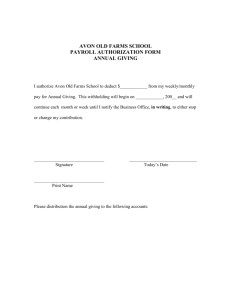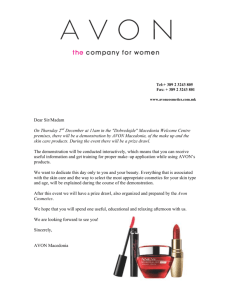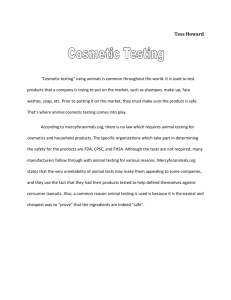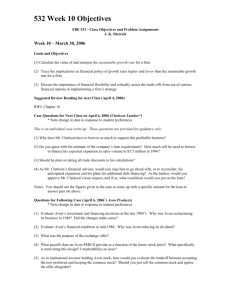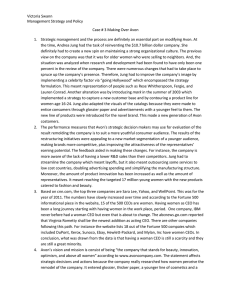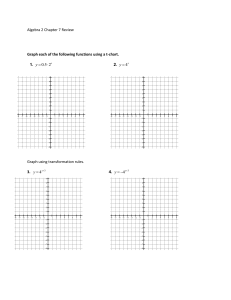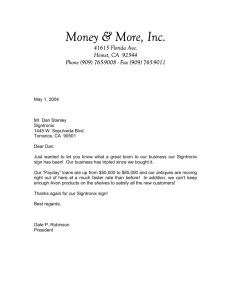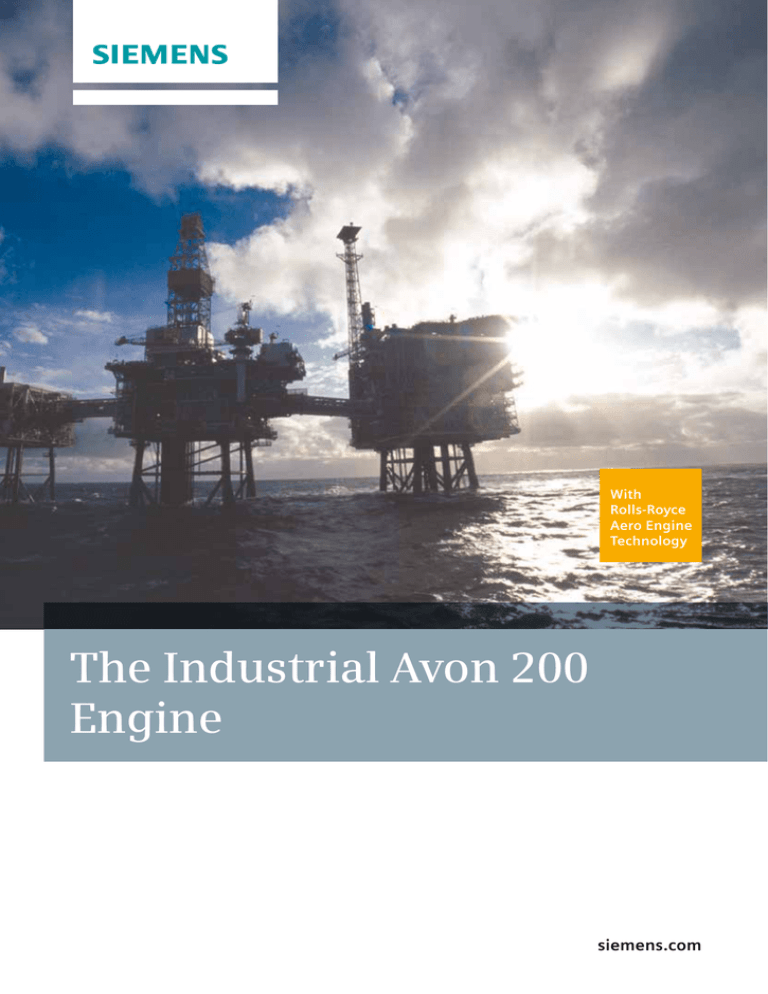
With
Rolls-Royce
Aero Engine
Technology
The Industrial Avon 200
Engine
siemens.com
2 / Industrial Avon 200 Engine
The Industrial Avon 200
Technology heritage
Advanced technology used in civil and military engines
is incorporated into the new, higher power Industrial
Avon 200 to upgrade the proven performance of the
Industrial Avon gas generator.
The result is an industrial engine with:
•Higher power capability
•Improved thermal efficiency
•Extended component life
•Reduced maintenance costs
•Improved environmental impact
Siemens acquired the Rolls-Royce aero-derivative gas turbine and compressor business effective December 1, 2014. References to Siemens
and products are intended to refer to such business as acquired and incorporated into Siemens as from such effective date.
Industrial Avon 200 Engine / 3
“With over 60 million
operating hours in
industrial applications,
the Industrial Avon gas
generator has proven
time and again that it
is the class leader for
reliability.”
Improving performance
Most operators know the Industrial Avon gas generator.
They know its performance specification and its
reputation for unsurpassed reliability. With over 60 million
operating hours in industrial applications, the Industrial
Avon gas generator has proven time and again that it is
the class leader for reliability. Operators continue to plan
their projects based on the Industrial Avon’s reliability.
Performance improvement
Power increase of 7.5–9.0 per cent at base load
Improved thermal efficiency up to 4.4 per cent at
base load
Improved emissions*
Today, Siemens is offering Industrial Avon operators more
value than ever with the Industrial Avon conversion. This
engine sets new standards of power, efficiency, life cycle
costs and environmental impact.
Significant reductions in CO and CO2 emissions can be
expected when operating at the enhanced or current base
rating
Applicability
Increased mean time between overhauls*
The Industrial Avon 200 comes with Rolls-Royce Aero
Engine Technology and has unrivalled experience to meet
these values.
An expected 20 per cent increase in current mean time
between overhauls (MTBO) when operated at the pre–
upgrade base load rating
Industrial Avon 200 conversion by Mod 5020 is available
for retrofit to all in–service versions of the engine and can
be installed at overhaul when many other complementary
upgrades can also be incorporated.
Reduced overhaul work scope
Design changes have been made that either extend
component life or reduce the replacement effort during
overhaul (details provided within)
*Note: Site specific performance can vary. Please see your local Siemens representative for a site specific rating.
4 / Industrial Avon 200 Engine
Advanced aerodynamic
design for NGVs
New turbine casings
Latest design root fixing
for turbine blades
Advanced
aerodynamic design
for turbine blades
HP turbine assembly
Design benefits
Turbine blades
The Industrial Avon 200 applies cutting edge technology
proven in other Siemens engine models to the turbine
section of the Industrial Avon gas generator.
•Material for all three rows of turbine blades is upgraded
and coated for corrosion resistance. Together with new
aerofoil designs this results in reduced overhaul costs.
This provides increased power, efficiency, component life
and reliability without increasing the exhaust gas
temperature. These improvements are achieved by making
material, sealing, geometry and cooling changes to the
HP, IP and LP turbine sections.
•The HP blade material is changed to a single crystal
material, eliminating the need for aerofoil cooling and
contributing to the overall improvement in power and
heat rate performance.
Key benefits
•Parasitic loss through air leakage is reduced by improved
root and tip shroud sealing of the turbine blades
improving overall unit power and heat rate performance.
Industrial Avon
160 root
Industrial Avon 200
HP root
Old fir tree blade
root
Two lobe root
reduces stresses,
improves stress distribution and fatigue
resistance
Old root with
weld–on seal plate
and 25 degree
skew
•The skewed cutting fir tree blade roots are replaced with
an axial cut, two–lobe design to reduce peak stress
concentrations. This improves resistance to high–cycle
fatigue damage, resulting in reduced overhaul costs.
•The HP blade features an under–platform damper to
reduce blade vibration stresses and fatigue damage.
Revised root blade
with integral seal
plate – Zero degree
skew provides
better resistance to
high cycle fatigue
Two lobe axial cut
serrations provide
improved fatigue
resistance
HP turbine blade
under–platform
damper to reduce
aerofoil vibratory
stresses and
fatigue damage
Industrial Avon 200 Engine / 5
“The Industrial Avon
200 applies cutting
edge technology
proven in other
Siemens engine models
to the turbine section
of the Industrial Avon
gas generator.”
Turbine blades (continued)
Disc
Key benefits
Key benefits
Profiled end walls and 3D
aerodynamic design techniques
improve stage efficiency, overall
unit power and heat rate
performance.
Disc head geometry has
been modified to provide
lower stresses. This results
in improved resistance to
fatigue damage and
reduced overhaul cost.
3D aerofoil design and profiled end wall
improve turbine efficiency and overall
power and heat rate performance
Single crystal material removes the need
for cooling, improving efficiency
ew disc geometry reduces
N
stress, improves stress
distribution and fatigue
resistance
Nozzle Guide Vanes (NGV)
Turbine casings
Old disc
geometry
New disc
geometry
Key benefits
Key benefits
IP and LP NGVs are changed
from hollow to solid aerofoils
for a more robust design.
rofiled NGV end walls improve
P
efficiency
Profiled HP NGV end walls and 3D aerodynamic design
techniques improve stage efficiency and overall unit
power and heat rate performance
•Steel material is retained with forgings replacing the
original centri–spun castings. Thicker casing walls reduce
operating stresses, creep damage and overhaul costs.
•All three stages of rotor blade tip seal liners now use
segmented rings with stepped radial seals. This improves
tip clearance control and reduces over–tip leakage to
improve overall performance.
Turbine blade tip seal
Traditional design has large
clearance over blade tips,
allowing over–tip leakage
HP NGV
Turbine blade tip seal
HP blade
New design has
improved sealing to
reduce over-tip leakage
6 / Industrial Avon 200 Engine
Gas
Locating pin atomiser for starting
on liquid fuel
Unique combuster for swirler
burner
Compressor
air delivery
Outer swirler
Inner swirler
Burner swirler
Avon Swirler burner improvement
Design benefits
Combustion system
Key benefits
•The Swirler burner configuration is the standard and
mandatory combustion system used with the Industrial
Avon 200, which has demonstrated extensive service
experience.
•
Swirler burner technology helps reduce combustion
instability associated with liquid hydrocarbon
carryover from the gas fuel. This gives smoother
combustion, extended discharge nozzle life and
reduces burner fouling, giving improved availability.
Industrial Avon 200 nominal emissions vs Industrial
Avon 1535–160
•Increased reliability and reduced overhaul costs can also
be expected by minimising the effect of high cycle
fatigue (HCF) on turbine blades and discs.
•In addition, significant reductions in CO and CO2
emissions can be expected when operating at the
enhanced or current base rating (as seen in the chart
below). No change in NOx emissions is anticipated.
Industrial Avon 200 reduced carbon footprint
1535 CO2 reduction with Industrial Avon 200 conversion
Industrial Avon
1535–160 Std
Triple Dish
Combustor
(natural gas)
Industrial Avon
200 with Swirler
Burner (natural
gas)
Exhaust Gas
Power EGHP
19,578
26,000
19,578
26,000
NOx
15% O2
vppm
69
84
69
85
85,000
lb/hr
66
87
67
89
84,500
CO
vppm
146
106
28
25
84,000
lb/hr
86
67
17
16
87,500
87,000
86,500
2.6% reduction
86,000
85,500
83,500
CO2 tons
per year
1535–160
1535–200
2.6% reduction in CO2 at 1535 base load power
Industrial Avon 200 Engine / 7
“The Swirler burner
configuration is the
standard combustion
system used with the
Industrial Avon 200,
which has
demonstrated
extensive service
experience.”
Scope of work
Requirements
•Engine conversion
•Minor control system changes
•Review balance of package and drive train
Undertaken
•Ideally at time of overhaul
A measurable difference
•The benefits of increased power and efficiency are
quantified in the charts opposite
Fuel savings
Fuel $/mm BTU
Fuel savings between overhauls
1.0
$142,000
2.0
$284,000
2.5
$355,000
5.0
$710,000
7.5
$1,065,000
10.0
$1,420,000
12.5
$1,755,000
Production value
Process $/mm
BTU
Electricity $/kWe–hr
0.06
0.03
$1,272,000
0.10
0.05
$2,121,000
0.14
0.075
$3,182,000
0.29
0.15
$6,363,000
0.42
0.22
$9,332,000
0.57
0.3
$12,726,000
0.72
0.38
$16,120,000
1.0
0.55
$23,331,000
2.0
1.1
$46,662,000
2.5
1.34
$56,843,000
5.0
2.68
$113,686,000
7.5
4.0
$169,680,000
10.0
5.35
$226,947,000
12.5
6.69
$283,790,000
Complementary Upgrades
•RT48S power turbine conversion (ES4001)
•New exhaust transition duct (ES6011)
•Controls upgrade (ES6006)
•Lube oil console (ES2007) – Phase 1 and 1.5 engine
conversion to Phase 2
•Rotary Variable Differential Transducers (RVDT) (ES2008)
•Closed loop VIGV control (ES2009)
•New discharge nozzles with thermal barrier coating
(Mod 4604)
•New compressor coatings (Mod 5010)
•New combustors (Mod 5026)
Notes: Values are based on comparisons to Industrial Avon 1535,
ISO conditions. Fuel is cost of fuel gas. Production is value of
process or electricity production. Standard equipment,
specifications and data are subject to change without notice.
Incremental
production between
overhauls
Published by and copyright © 2014:
Siemens AG
Power and Gas
Freyeslebenstrasse 1
91058 Erlangen, Germany
For more information, please contact
our Customer Support Center.
Phone: +49 180 524 70 00
Fax: +49 180 524 24 71
(Charges depending on provider)
E–mail: support.energy@siemens.com
Order No. E50001–G430–A122–X–4A00
WS 1114
Printed on elementary chlorine-free
bleached paper.
All rights reserved. Trademarks
mentioned in this document are the
property of Siemens AG, its affiliates, or
their respective owners. Product Mark
Avon is a trademark of and used under
license from Rolls-Royce plc.
Subject to change without prior notice.
The information in this document
contains general descriptions of the
technical options available, which may
not apply in all cases. The required
technical options should therefore be
specified in the contract.

